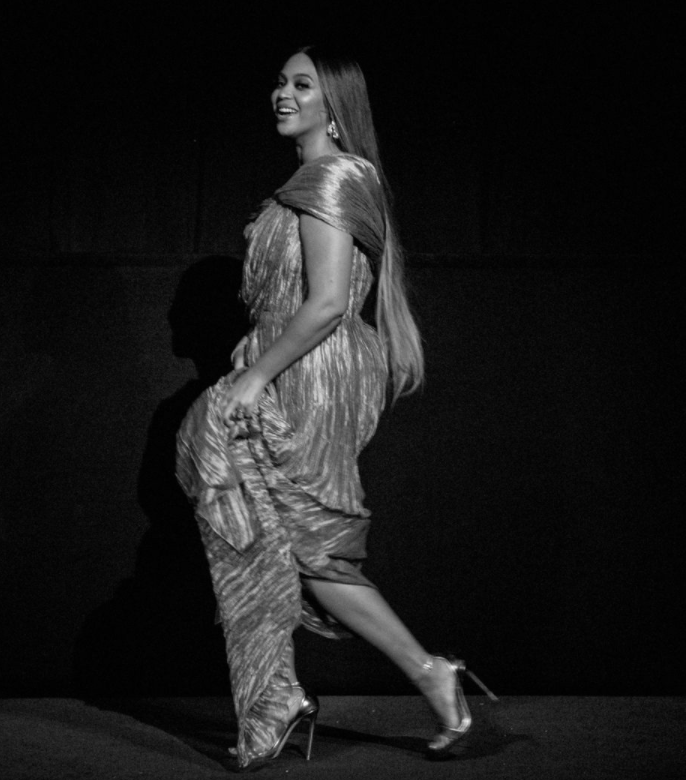In February 2016, Saturday Night Live released one of its more well-known sketches in the wake of Beyoncé putting out “Formation,” a single that would end up on Lemonade soon after, but at the time, was merely part of the promotion for her Super Bowl performance with, oddly enough, Coldplay and Bruno Mars. As an outcry against the “aesthetic” of the video and content of the lyrics, SNL built the premise of their sketch around the “sudden” revelation of white people that Bey was–gasp!–black. So it is that a voiceover narrates as white people do white people things, “For white people, it was just another great week. They never saw it coming. They had no warning. Then–the day before the Super Bowl–it happened.” The iconic opening notes to “Formation” are cued as actual news reports like, “Beyoncé releases a new music video that embraces her black heritage” swirl, repeating the word “black” as though it’s an insult to whites and calling out Beyoncé’s support of the Black Lives Matter movement.
Aidy Bryant, watching the news reports, shouts out, “I think Beyoncé is…black.” This leads into the title for the imagined white person’s horror movie, The Day Beyoncé Turned Black. As a group of white co-workers listen to the song on their headphones in an office, one woman admits, “Guys? I don’t understand this new song.” Another quotes the lyric incredulously, “Hot sauce in my bag, swag?” Then the slow realization: “Maybe the song isn’t for us.” This is woefully bemoaned with, “But usually everything is!” The voiceover continues, “It was the day that white people lost their Beyoncé.”
And have been, in their minds, ever since that fateful February 6th in 2016. For Beyoncé is only doubling down on her commitment to highlighting black pride and excellence with “Black Parade,” a song in celebration of Juneteenth, or rather, what Beyoncé has effectively rendered into Juneteenth Weekend as she wrote, “Happy Juneteenth Weekend! I hope we continue to share joy and celebrate each other, even in the midst of struggle. Please continue to remember our beauty, strength and power. ‘Black Parade’ celebrates you, your voice and your joy and will benefit Black-owned small businesses.” Of course, white people might need to remember that the “you” in this is not about them, just as they were forced to reconcile such horror in the days that followed the release of “Formation,” criticized at the time for taking an anti-police stance (which Bey lightly denied at the moment because the U.S. still wasn’t ready, but it’s pretty clear she was flipping the bird to all the little piggies). As part of an initiative to help support black-owned businesses, Beyoncé also added, “Being Black is your activism. Black excellence is a form of protest. Black joy is your right.” And white people are fainting again.
When “Formation” was reviewed, it was heralded as “a song that kept hope alive in a bleak year–and it will be essential ammo for the struggles to come in the next” (no one knew just how that true would be) and “in the era of #BlackLivesMatter, ‘Formation’ felt downright necessary.” The same could be said of “Black Parade,” as Beyoncé declares, “Being black, maybe that’s the reason why they always mad/Yeah, they always mad, yeah/Been past ’em, I know that’s the reason why they all big mad/And they always have been.” Addressing the constancy of the white oppressor’s need to attempt suppressing black excellence through violence (most notoriously exemplified in the Black Wall Street massacre of 1921), Bey posits that, basically, jealousy’s a terrible disease–though she might not necessarily include the add-on, “Get well soon, bitch.” Further shading the white tendency to both 1) persecute and 2) remain blithely ensconced in their bubble of privilege, Beyoncé asserts, “Rubber bullets bouncin’ off me/Made a picket sign off your picket fence.” Because you can’t keep a black girl down. And yes, this is another femme-centric song about blackness, as Beyoncé has become known for (“I can’t forget my history/It’s herstory…/Motherland, motherland drip on me”).
What’s more, since the track is a nod to black economic prosperity, Yoncé is also sure to mention one of the greatest examples of black wealth in history, Malian emperor Mansa Musa. And then came Beyoncé. At the time of “Formation” domination, the music video’s director, Melina Matsoukas, who put many hours into researching historical materials to come up with the concept and treatment, stated, “I wanted to show—this is black people. We triumph, we suffer, we’re drowning, we’re being beaten, we’re dancing, we’re eating, and we’re still here.” Even in the face of death threats and vicious backlash, which Beyoncé received in spades not only for speaking out against police brutality, but for her Black Panther homage while performing the song during the Super Bowl, run by the notoriously white supremacist organization that is the NFL.
In fact, almost immediately after the performance, a #BoycottBeyonce (along with #BlueLivesMatter) hashtag was trending, with white audiences scandalized by her pro-Black Lives Matter stance “soiling” a “great American tradition” (of racism and white silence). Indeed, that Beyoncé managed to pull off getting the performance sanctioned was nothing short of a miracle, and an incredibly momentous occasion for black audiences everywhere. One supposes the “payback” for such “defiance” was Donald Trump’s election later that year.
And yet Beyoncé will continue to defy, to stand up and proudly announce her blackness, even to those white people who tried briefly to forget about it after the “shocking epiphany” of that February in 2016. “Black Parade” further makes sure of that, with Bey appointing herself as the pied piper of a procession of unapologetic black greatness.






















